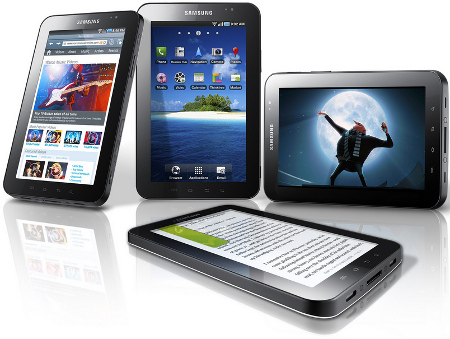Android tablets forecast to grab 15 percent share in 2011
Nov 18, 2010 — by LinuxDevices Staff — from the LinuxDevices Archive — viewsTablet computers based on Android will comprise 15 percent of the worldwide market in 2011, nibbling at Apple's iPad share similar to the way Android smartphones gained on the iPhone. That's the prediction from IMS Research, which adds that by 2015, Android tablets will have garnered 28 percent of the market.
Some 15 hardware makers will sell Android tablets, including Samsung, Dell, Motorola and Cisco. To date, however, Samsung has placed the biggest bet on the Google-backed, Linux-based operating system.
Samsung launched its Galaxy Tab (below) on T-Mobile, Sprint and Verizon Wireless in the U.S., with a launch on AT&T set for Nov. 21. The company expects to sell one million tablets in the 2010 holiday season alone.

Samsung's Gaalaxy Tab has been adopted by a variety of carriers
"The availability of Samsung's Galaxy Tab tablet via mobile carriers such as AT&T in the US will quickly boost Google Android's presence in the tablet market," said IMS Research analyst Anna Hunt.
While Hunt did not address this specifically, Android will owe its rise to Apple's iPad, which may command as much as 75 percent of the market or more by this time next year.
That tablet's popularity soared soon after it launched in April, selling millions of units within the first few months, 4.19 million in the fourth quarter alone.
IMS' findings take on a more poignant appeal in the wake of the just-wrapped Web 2.0 Summit in San Francisco.
 At the show, moderators asked industry luminaries such as media mogul Peter Chernin, Netflix CEO Reed Hastings, and FCC Chairman Julius Genachowski (right) what they thought of the battle between Google and Apple for the mobile Web.
At the show, moderators asked industry luminaries such as media mogul Peter Chernin, Netflix CEO Reed Hastings, and FCC Chairman Julius Genachowski (right) what they thought of the battle between Google and Apple for the mobile Web.
Genachowski said the new "apps economy" has created hundreds of thousands of jobs for software developers. That's particularly true for Apple's iOS platform, which has more than 300,000 apps for the iPhone, iPod touch and iPad.
Some 25,000 of those were designed specifically for the iPad. Apps for Android tablets such as the Galaxy Tab should prove fruitful next year as the hardware ships in earnest.
Apple has placed such a premium on quality content and apps for the tablet form factor that it forced hardware makers such as Research in Motion and HP to invest in OS technology to address this trend.
For example, RIM acquired QNX, and HP snapped up Palm to gain the serviceable webOS platform for the Palm Pre. RIM is launching the Blackberry Playbook next year, while HP plans to offer webOS tablets next year.
IMS Research's Hunt questioned whether RIM and HP — which lack the broad application ecosystems Apple iOS and Google Android have fostered — will supply the content and user experience to lure consumers.
Even so, some people will buy them on brand alone. Next year, Hunt said almost eight percent of tablets shipped will run RIM's QNX-based OS and HP's webOS platform.
This segment of non iOS and Android-based tablets is forecast to grow to 19.3 percent of unit shipments in 2015, proof that there is enough tablet pie to go around for the next half decade.
What about Microsoft tablets? The near-term future appears bleak, as Hunt wrote: "Considering the low number of announcements for tablets running Windows 7 OS, IMS Research forecasts that Windows will account for a very small percentage of tablet shipments during the next couple of years."
However, HP said Nov. 15 its Windows 7-based HP Slate 500 tablet PC, is on backorder due to "extraordinary demand."
Further information
More information on the full IMS Research report, titled "Impact of Connected Tablets on the CE Market - 2010 Interim Report," may be found on the company's website, here.
Clint Boulton is a writer for eWEEK.
This article was originally published on LinuxDevices.com and has been donated to the open source community by QuinStreet Inc. Please visit LinuxToday.com for up-to-date news and articles about Linux and open source.